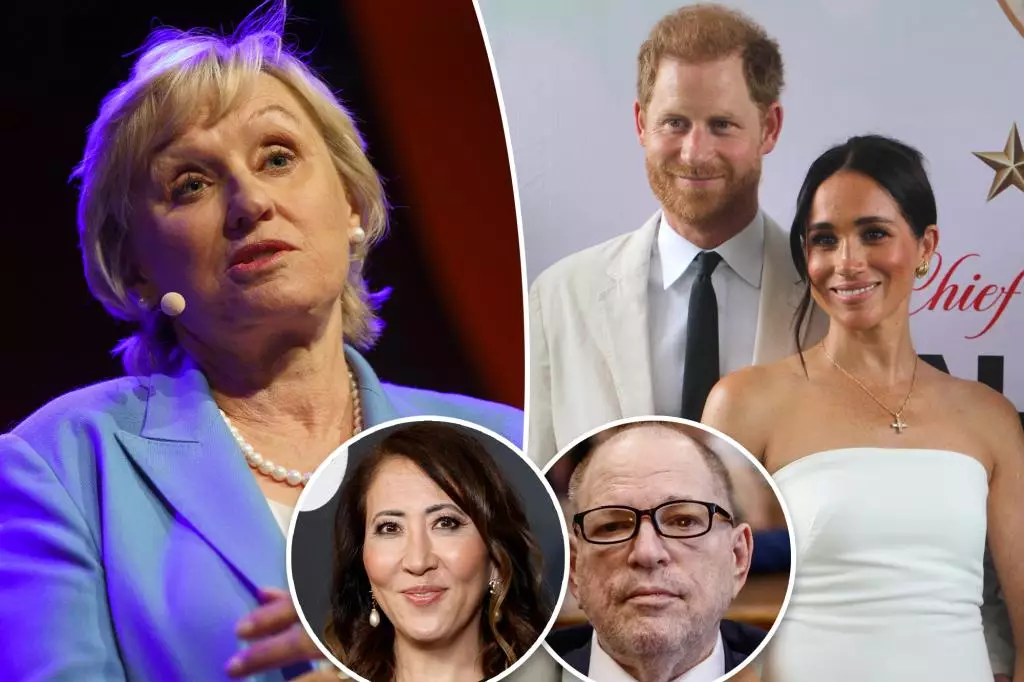In the realm of celebrity culture and royal dynamics, few figures generate as much discussion as Meghan Markle and Prince Harry. Recently, renowned journalist and editor Tina Brown, in an appearance on Janice Min’s podcast, offered a harsh critique of the couple, highlighting the complexities of their public image and personal decisions. Brown’s commentary reveals not only her opinions on the Duke and Duchess of Sussex but also reflects broader themes regarding celebrity, judgment, and the consequences of choices made within the public eye.
Tina Brown unequivocally expressed her disdain for Meghan Markle’s decision-making skills, asserting that “all of her ideas are total crap.” This provocative statement begs the question: what constitutes a sound decision in the tumultuous world of fame and royalty? Brown paints Markle as someone who, despite her perfectionist tendencies, consistently falters in judgment. She argues that Markle possesses an inherent flaw; she solicits advice but ultimately disregards it, following her own misguided intuition. This portrays a figure whose aspirations exceed her grasp, resulting in a series of missteps that have significant repercussions both personally and publicly.
Brown’s characterization of Markle connects with a larger narrative about the dangers of unchecked ambition—especially in the glitzy backdrop of Hollywood and royal expectations. As Markle navigated her path from television actress to Duchess of Sussex, she appeared to miscalculate her ambitions in the face of entrenched institutional norms and media scrutiny. Brown suggests that Markle, in her quest for independence and rebranding, has failed to recognize the gravity of her situation, ultimately leading to self-sabotage. The consequences of not heeding wise counsel have manifested in a public persona that oscillates between victimhood and controversy, casting shadows over her achievements.
In her critical analysis, Brown does not spare Prince Harry, whom she describes as a “lamb to the slaughter.” Here, we see a vivid portrayal of a man entrapped by the allure of love and the charisma of his partner. Harry’s portrayal as naïve reflects a poignant critique of a royal’s departure from the structured, protective confines of royalty. By aligning himself with Markle, it appears he has been swept along in a current of ambition and optimism that blinds him to the harsh realities of their choices.
Brown highlights Harry’s commendable talents as a prince, suggesting that he is exceptional in fulfilling his royal duties. Yet, the tragedy lies in his inability to adapt to the new terrain outside Buckingham Palace—one filled with media frenzy and relentless scrutiny. In leaving the royal family, Harry seemingly abandoned not only his title but also the guidance and support inherent to it. Thus, Brown invites listeners to ponder if Harry’s infatuation has cost him the very identity that had once defined him.
Brown’s candid recollection of her own professional miscalculations further illuminates her commentary on Markle and Harry. Reflecting on her collaboration with Harvey Weinstein, she admits that partnering with him was “the dumbest career move of anybody’s life.” This admission serves as a potent reminder of how societal perceptions can swiftly change, particularly when it comes to powerful figures. Just as Weinstein’s reputation unraveled, leaving a trail of disgraced partnerships and lost respect, so too can the celebrity status of Markle and Harry fluctuate in public perception.
The implication here is that just as Brown grappled with her relationship with Weinstein and the eventual fallout, Markle and Harry must navigate a similarly precarious landscape. The spectacle of celebrity comes with inherent risks; one miscalculated move can lead to public disdain, just as Brown experienced when her association with Weinstein changed from admiration to controversy. This dynamic casts a shadow over the broader discourse of trust—who can truly be trusted in a world dictated by image and expectation?
As Brown speculates about their future, she adopts an ominous tone, suggesting that Markle’s series of misjudgments may have limited her options, while expressing more hope for Harry’s potential for recovery. This insight touches upon deep societal themes: resilience, redemption, and identity. In a world where public personas can be sculpted and reshaped, both figures face daunting challenges, as they grapple with their legacies in the lives they’ve chosen.
Ultimately, Tina Brown’s insights invite reflection on the complexities of celebrity life, the weight of personal decisions, and the often-unforgiving nature of public opinion. For those thrust into the spotlight, the stakes are high, and each move can have lasting implications—a lesson both Markle and Harry are steeped in as they navigate the treacherous waters of their choice to break free from royal constraints. The conversations surrounding them are not only about their individual attributes but serve as cautionary tales about the broader implications of fame, ambition, and the struggle for authentic identity in the face of scrutiny.

Leave a Reply